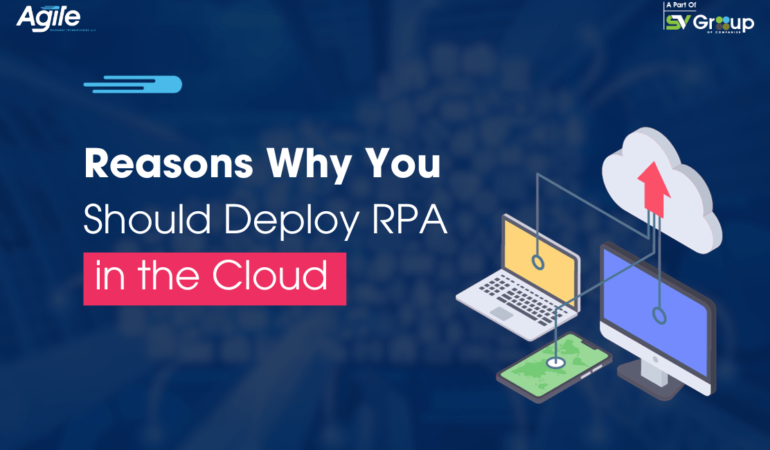Reasons Why You Should Deploy RPA in the Cloud

Robotic process automation (RPA) has reached a point where organisations are no longer debating its benefits. They acknowledge it is a must-have technology if they wish to streamline their processes and stay ahead of the competition. When talking about RPA, businesses can choose on-premises implementation or cloud deployment. As a leading RPA services company, Agile Managex Technologies offers both solutions.
However, in the past few years, on-premises solutions are facing problems. In-house teams don’t have the resources to implement new patches or work on updates. The servers might be a bottleneck, or the organisation’s hardware may no longer be compatible with the solutions. As a result, businesses are turning to cloud RPA solutions. This article discusses the top reasons why businesses must turn to cloud RPA.
Why Cloud RPA is the Best Option
There are several reasons to skip on-premises solutions and move straight to cloud solutions, also known as RPA as a Service (RPAaaS). However, the two are not the same. RPAaaS refers to subscription-based RPA, whereas cloud-based RPA includes RPAaaS and self-managed solutions.
- Cost
On-premises RPA solutions require a dedicated in-house IT team to manage the solutions. Of course, this adds to the organisational expenses. On top of it, the business may need to upgrade hardware and related software frequently to ensure compatibility with the implemented solutions. Therefore, the cost of on-premises solutions is quite high.
On the other hand, a cloud-based RPA solution is less expensive. How? Firstly, there is no need to have an in-house team as everything is on the cloud. A business can simply use the app without worrying about anything else. Secondly, there is no need to invest in hardware or software solutions.
A business only requires a reliable and secure internet connection to use the cloud-based RPA solution. The developer is responsible for the updates, patches, and regular maintenance. Therefore, cloud-based RPA is associated with a lower total cost of ownership than on-premises solutions.
- Agility
Suppose you need to automate an additional process. In an on-premises solution, adding a new process is time-consuming, considering the development, testing, and implementation. Secondly, the hardware and software aspects need to be considered as well. This is not the case with cloud RPA.
In RPAaaS, businesses only need to worry about acquiring the additional licence alone. It allows businesses to be more agile, i.e. responsive to changing business requirements. In other words, an organisation can scale its RPA solutions up or down based on the requirements.
- Maximum Security
It is quite challenging for in-house IT teams to monitor your networks and digital assets for potential breaches or leaks. Due to the high instances of cyberattacks, IT teams always find themselves on the back foot. From the business perspective, there are two options. An organisation can opt for managed IT service providers.
These companies provide on-premises or remote teams or individuals to look after your cybersecurity. Of course, introducing additional resources can strengthen your defences, but only to a certain extent. The better option is to opt for cloud-based RPA, as cloud providers invest heavily in security measures.
- Disaster Recovery
Cloud-based providers take regular backups. In case of an incident, your RPA solutions will be up and running quickly. It ensures little business disruption and protects the organisation against substantial financial losses.
- Accessibility
Lastly, another benefit of a cloud-based RPA is its accessibility. An organisation can access the solution from anywhere in the world. It is not possible with on-premises solutions. Due to the increasing reliance on remote teams, cloud-based RPA is more feasible.
Conclusion
There are countless other reasons businesses should consider moving to a cloud-based RPA solution. However, we acknowledge that cloud-based RPA is not feasible for everyone. Therefore, we recommend a hybrid approach. It would enable businesses to benefit from both types of solutions. Contact us for more information on RPA and how it can add value to your organisation.

Leave A Comment